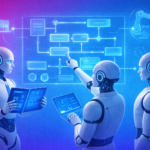The New Frontier of IT Operations in 2025
The complexity of modern IT infrastructure has reached a tipping point. Managing vast networks, countless applications, and continuous security threats is a monumental task that can overwhelm even the most skilled IT teams. This is where AI agents for IT automation are stepping in to redefine the landscape. These intelligent systems are moving beyond simple scripts and manual commands, leveraging machine learning to autonomously monitor, diagnose, and resolve issues. They are not just tools for efficiency; they are a strategic necessity for businesses aiming to maintain stability, security, and agility in 2025.
This guide will explore the transformative benefits of integrating AI agents into your IT operations, highlighting key AI business tools in 2025 and showcasing how they are driving a new era of proactive and self-healing IT environments.
The Benefits of AI Agents for IT Operations
AI agents bring a host of advantages that fundamentally change how IT departments operate:
- 24/7 Proactive Monitoring and Anomaly Detection: Unlike human staff, AI agents never sleep. They continuously monitor systems and network traffic, collecting and analyzing vast amounts of data in real time. They are trained to recognize patterns of normal behavior, allowing them to instantly detect and flag anomalies that may indicate a security breach, a failing server, or a performance bottleneck. This proactive approach prevents small issues from escalating into major outages.
- Rapid Troubleshooting and Incident Response: When an issue does arise, an AI agent can significantly reduce the time-to-resolution. It can automatically run diagnostic tests, correlate data from multiple sources (e.g., logs, system metrics, network performance), and pinpoint the root cause of a problem in minutes, not hours. For common issues, the agent can even initiate automated remediation, such as restarting a service or rolling back a configuration change, before a human is even notified.
- Predictive Maintenance: The most advanced AI business tools in 2025 are predictive. By analyzing historical data on system performance and hardware failures, AI agents can predict when a component (like a hard drive or a server) is likely to fail. This allows IT teams to perform maintenance or replace hardware before a failure occurs, preventing unexpected downtime.
- Enhanced Security Posture: AI agents play a crucial role in modern cybersecurity. They can analyze network behavior to identify suspicious activity, user anomalies (e.g., a login from an unusual location), and potential phishing attempts. By automating the detection and response to these threats, they provide a robust first line of defense against cyberattacks.
- Operational Efficiency and Cost Savings: By automating repetitive and time-consuming tasks like patch management, routine backups, and ticket triaging, AI agents free up your IT staff to focus on strategic projects, innovation, and complex problem-solving. This reallocation of resources directly translates into significant cost savings and increased productivity. As Harvard Business Review highlights, automation is key to business growth.
Key AI Agent Tools and Applications
The market is filled with powerful AI tools designed to automate and optimize IT tasks. Here are some of the most impactful applications:
- AIOps (Artificial Intelligence for IT Operations) Platforms: These platforms are the backbone of AI-powered IT. They ingest data from all your IT systems and use machine learning to provide actionable insights, automate diagnostics, and orchestrate incident responses. Tools in this category can automatically create a ticket for a human when needed, attaching all relevant diagnostic data.
- Intelligent Chatbots and Virtual Assistants for IT Support: These agents can handle a large percentage of IT help desk tickets. They can answer common questions about software access, reset passwords, guide users through troubleshooting steps, and automatically route complex issues to the correct human IT specialist.
- Security Orchestration, Automation, and Response (SOAR) Platforms: In cybersecurity, AI agents within SOAR platforms can analyze threat data, identify a malicious event, and automatically take a series of predefined actions, such as isolating an infected machine, blocking an IP address, or notifying the security team.
- Performance Monitoring Tools with AI: Next-generation monitoring tools use AI to establish a performance baseline for applications and systems. They can alert IT teams to subtle performance degradation that may be a sign of an impending issue, allowing for proactive intervention.
As PYMNTS emphasizes, a strong tech stack is crucial for modern business success, and AI automation tools are a core component of that stack.
Conclusion: Embracing an AI-First IT Strategy
The shift to AI agents for IT automation is not a future trend; it’s a present-day reality that is separating innovative companies from those at risk of falling behind. By leveraging these intelligent tools, IT departments can move from a reactive, fire-fighting mode to a proactive, strategic one. This transformation results in more stable systems, enhanced security, reduced operational costs, and an IT team empowered to drive business value.
To start your journey into AI-powered IT, it’s crucial to understand your specific business needs and choose the tools that align with them. To learn more about this, explore our comprehensive guide on this topic: How to Choose the Right Agent for Your Business in 2025.
The future of IT is automated, intelligent, and resilient, and it’s powered by AI agents.





